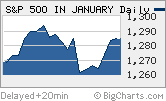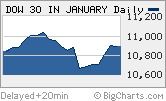|
Stocks fall after the Fed
Market dips after Fed lifts rates, hints more hikes may be on tap; after-hours, Google disappoints.
NEW YORK (CNNMoney.com) - Stocks slipped Tuesday after the Federal Reserve boosted a key short-term interest rate by a quarter-percentage point as expected, and said more rate hikes may be needed. Stocks were also set for a weak open Wednesday, following disappointing quarterly results from Google after the close of trade -- which sent Nasdaq and S&P futures lower.
The Standard & Poor's 500 index (down 5.12 to 1,280.08, Charts) lost 0.4 percent, while the Dow Jones industrial average (down 35.06 to 10,864.86, Charts) lost 0.3 percent. The Nasdaq composite (down 0.96 to 2,305.82, Charts) ended just below unchanged. The three major gauges had see-sawed on both sides of the unchanged line following the 2:15 p.m. ET Fed announcement, as investors attempted to digest the implications of the news and statement. However, the tone turned more negative just before the close, as Wall Street geared up for Google. After the close, the Web leader reported quarterly earnings that met revenue forecasts but missed earnings expectations. (Full Story). Shares fell over 13 percent in extended-hours trade and weighed on other tech stocks, including Yahoo! (Research) and eBay (Research). “It’s disappointing, but not entirely surprising,” said Donald Selkin, director of research at Joseph Stevens, noting that many bellwether tech companies have issued disappointing results or forecasts for the last quarter of 2005, including Yahoo!, Intel and Motorola. In addition, Google stock has surged more than 400 percent since its debut as a public company in the summer of 2004, which both raised expectations for the company’s earnings potential to lofty levels and made the stock ripe for some profit taking, Selkin noted. “The open tomorrow is going to be bad,” Selkin added. “But the market will digest this and if the jobs report Friday is decent, maybe we can finish up the week on the upside.” The January jobs report is due Friday. Ahead of that, investors will take in readings on construction spending and manufacturing Wednesday morning. Wednesday also brings earnings from Boeing (Research) and Time Warner (Research). On an up note, the S&P 500 ended January in the plus column, which could be a good harbinger for the year, according to the Stock Trader’s Almanac. For the month, the S&P 500 added 2.6 percent, the Dow 30 added 1.4 percent and the Nasdaq composite added 4.5 percent. Fed boosts rates
Fed policy makers met Tuesday, led for the last time by Chairman Alan Greenspan. As expected, the central bankers opted to boost the Fed funds rate, an overnight bank lending rate, by a quarter-percentage point to 4.5 percent, the 14th consecutive rate hike since June 2004. (Full story.) In its statement, the Fed acknowledged the strength of the economy, despite challenges, and said that "some further policy firming may be needed to keep the risks to the attainment of both sustainable economic growth and price stability roughly in balance." Although the statement was the most moderate it's been in months, it left the door open for more rate hikes, a factor that no doubt disappointed the most bullish stock investors, but wasn't particularly a shocker. Stephen Stanley, chief economist at RBS Greenwich Capital, said that the changes to the statement were minimal, which was perhaps surprising, as a more pronounced change would have given new chairman Ben Bernanke maximum flexibility when he takes over in February. “I think we're left with the presumption that they will probably raise by another quarter-percentage point in March,” Stanley said. However, “the market had already priced in a 75 or 80 percent chance of a hike in March and the statement is consistent with that,” Stanley added. “So the reaction you're seeing in both stock and bond markets is muted.” Treasury prices ended modestly higher, recovering some after falling on the Fed news. The yield on the 10-year note fell to 4.52 percent from 4.53 percent late Monday. In currency trading, the dollar fell versus the euro and the yen. Stock movers
In corporate news, Dow stock Altria reported quarterly earnings that rose from a year ago, but missed estimates. The consumer products company also warned that 2006 earnings will drop due to restructuring costs at its Kraft Foods division. Altria (down $1.57 to $72.34, Research) shares fell over two percent. Kraft (down $0.56 to $29.44, Research) shares fell too, on news that the company will cut 8,000 jobs as part of a large restructuring plan. That overshadowed the company's higher quarterly earnings report. Merck (up $0.04 to $34.50, Research) reported quarterly earnings that rose from a year earlier and topped estimates, on revenue that was flat. Shares of the Dow component ended little changed. On the upside, Dow stock Alcoa (up $0.97 to $31.50, Research) jumped more than 3 percent after UBS upgraded the stock as part of a broader upgrade of the metals and mining sector. Intel (down $0.40 to $21.26, Research), KLA-Tencor (down $1.52 to $51.98, Research) and Applied Materials (down $0.53 to $19.05, Research) were among the issues dragging down the Philadelphia Semiconductor (down 7.89 to 539.11, Charts) index, or the SOX, by 1.4 percent. Oil stocks were lower, too, with the Philadelphia Oil Service (down 2.01 to 221.53, Charts) index losing close to 1 percent. Market breadth was positive. On the New York Stock Exchange, advancers topped decliners nearly six to five on volume of 1.98 billion shares. On the Nasdaq, losers beat winners by eight to seven on volume of 2.28 billion shares. U.S. light crude oil for March delivery fell 43 cents to settle at $67.92 a barrel on the New York Mercantile Exchange after OPEC decided to keep oil output near the highest levels in order to combat high prices. COMEX gold rose $6.20 to settle at $572 an ounce. Investors also took in reports on consumer confidence and manufacturing in the Midwest area. The January Consumer Confidence index jumped to 106.3, topping estimates and bouncing back from December's reading. The January Chicago PMI, which measures manufacturing, fell to 58.5, below forecasts and last month's read. Nonetheless, anything over 50 signals expansion in the sector. _______________
Click here for the latest business news. |
|








